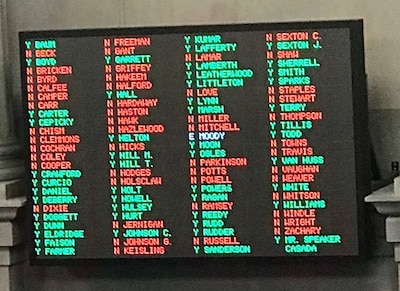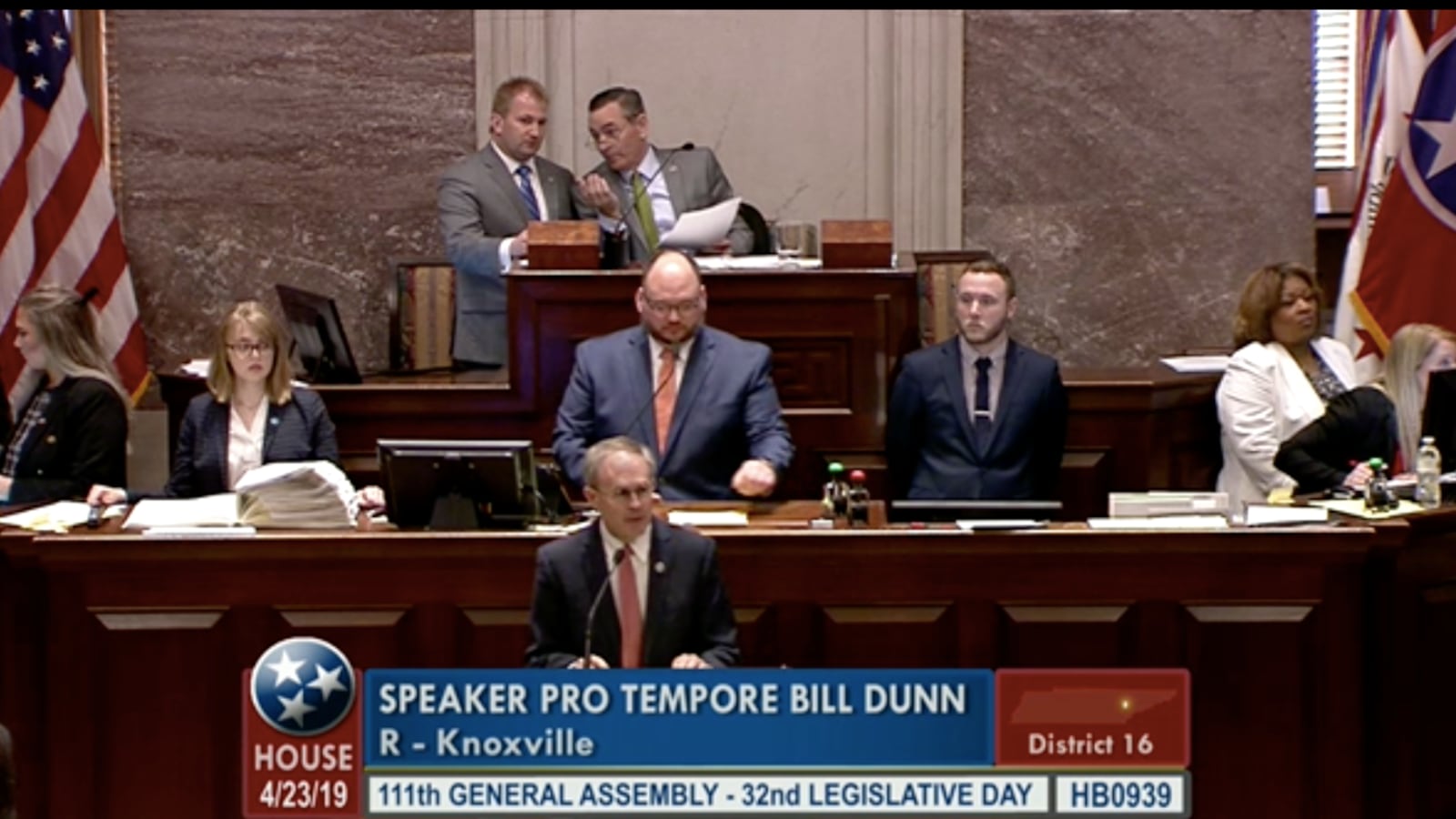In a historic and controversial vote, an education voucher bill narrowly passed for the first time in Tennessee’s House of Representatives as the state inched closer to letting some families use taxpayer money to pay for private education services.
Representatives voted 50-48 on Tuesday for Gov. Bill Lee’s proposal to start education savings accounts, a newer type of voucher. The vote came after almost three hours of contentious debate capped by last-minute dealmaking and several questionable parliamentary maneuvers by Republican House Speaker Glen Casada, who favors vouchers.
Under the House bill, the program would start in 2021 with up to 5,000 students from public school districts in the state’s four largest cities: Memphis, Nashville, Chattanooga and Knoxville. However, moments after the vote, Casada told reporters that Knox County eventually will be removed from the plan under an agreement with Rep. Jason Zachary, the Knoxville Republican who flipped his vote before the speaker ordered a final tally.
Meanwhile, a revised bill that would limit the program to students in school systems in Memphis and Nashville squeaked out of the Senate committee where the bill stalled last week.
All eyes now turn to the full Senate, where Lt. Gov. Randy McNally has said he believes the votes are in place for passage. That vote, slated for Thursday, could send the measure to a conference committee to work out significant differences between the House and Senate bills.
The governor praised House leaders and has scheduled a press conference on Thursday to review this week’s legislative work.
“Every student in TN deserves access to a high-quality education, and with today’s House vote, we’re one big step closer to giving parents and students needed choice in their education,” Lee said in a tweet.
The House vote was unprecedented. Voucher legislation had never before been voted on in that full chamber, having been pulled from the agenda at the last minute in 2016 when the bill’s sponsor realized that he didn’t have enough support.
The outcome was different this time, however, with the same Republican sponsor, Rep. Bill Dunn of Knoxville, and a new Republican governor who campaigned to give families more education choices for their children.
“The heart and soul of the bill is very simple. Parents will pursue the best educational experiences for their child,” said Dunn, who has shepherded it through the chamber that has been most resistant to vouchers for almost a decade.
Debate in the House was feisty and dramatic, with the vote’s tally being delayed at one point when the head count deadlocked at 49-49. Rep. Debra Moody, the Covington Republican who had planned to vote yes, was absent due to the death of her mother.
Casada eventually convinced Zachary to switch his vote for the governor’s plan, and the Knoxville Republican said later that the speaker had assured him that Knox County would be “held physically harmless regarding anything with ESAs.”
Outmanned Democrats opposing vouchers slammed the 11th-hour maneuvering and delayed tally as a violation of the chamber’s rules and constitutionally questionable.

In debate on the floor, members in Tennessee’s other large cities vented about restricting to urban districts a program that most lawmakers don’t want in their own backyards.
“If it’s not good enough for your children or your child, it’s not good enough for mine either,” said Rep. Antonio Parkinson, a Memphis Democrat.
Rep. Matthew Hill, a Republican from Jonesborough, said the urban districts were targeted “quite frankly because 99 percent of our failing schools in this state are encompassed in those four counties.”
And Rep. Michael G. Curcio, a Republican from Dickson, characterized each of the state’s lowest-performing schools as a “prison” and “pit” from which children needed to be saved.
Others like Rep. Patsy Hazlewood, a Signal Mountain Republican whose district would be included in the program under the final House bill, said she could not support the legislation even though she supports the philosophy behind vouchers.
“In my opinion, what we’re doing here is not going to be directed to the students who need the most help,” she said of extending eligibility to a family of four with a yearly income of $66,000. “That means that half of the families in Tennessee … could be eligible for this voucher in those counties. I don’t believe that’s what we ought to be doing.”
Meanwhile, in the Senate
Members of the Senate Finance Committee voted 6-5 to advance a revised voucher bill to the full Senate following two hours of testimony and debate.
Officials representing Shelby and Davidson counties told senators that launching the program could lead to double-digit increases in property tax rates in communities where those levies are already high.
“We can’t just tax our citizens to death,” said Shelby County Commissioner Michael Whaley.
Committee members debated at length on concerns about the citizenship of students participating in the program and the Senate bill’s removal of language requiring applicants to provide government-issued documents like birth certificates, driver’s licenses, or passports. Both supporters and critics of the governor’s initiative have said that provision could make the legislation vulnerable to a legal challenge.
Chairman Bo Watson also questioned why the proposal doesn’t require voucher recipients to take the same number of tests as their counterparts in public schools.
“There is an assumption that going to a private school is a better deal,” said the Hixson Republican. “It would seem to me that you would have to have the exact same data set in order for a parent to sit down and say private school X doesn’t do as well as public school Y.”
Both votes came as new research on a closely watched school voucher program in Louisiana offered some grim results. The study, released on Tuesday by researchers at the University of Arkansas, found that math scores went down for Louisiana students who used a voucher to attend a private school — and that those scores didn’t bounce back, even years later. The findings echo research out of Indiana, Ohio, and Washington, D.C.
Chalkbeat Bureau Chief Jacinthia Jones contributed to this report.

